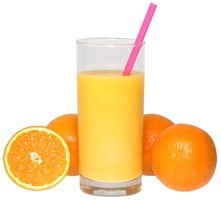An investigation team from the Technical University of Munich's Leibniz Institute for Food Systems Biology has figured out what causes a strange off-flavor in orange juice that tastes like cloves.
 Orange juice. Image Credit: Martin Steinhaus
Orange juice. Image Credit: Martin Steinhaus
For the first time, the investigation establishes that the odorant 5-vinylguaiacol is the cause of the unwanted flavor note. According to the study findings, the material is mostly created during the pasteurization process when heat-induced reactions between cleaning agent residues and naturally occurring orange juice components occur.
The orange juice industry has faced clove odor before. This is not the first time. 4-vinylguaiacol has been identified as the primary source of this unwanted flavor note, which is especially prevalent in orange juices that have been kept for an extended period of time. For this reason, the quantification of this odorant has long been a standard component of quality control procedures.
Recently, however, we have received reports of orange juice samples that had a pronounced clove odor despite a low concentration of 4-vinylguaiacol. We therefore asked ourselves which other odorants contribute to this undesirable off-flavor.”
Eva Bauersachs, PhD Student and Study First Author, Leibniz Institute for Food Systems Biology
On the Trail of Off-Flavors
The research team headed by Martin Steinhaus, the Head of the Leibniz Institute's Food Metabolome Chemistry research group, conducted in-depth studies in conjunction with the Technical University of Munich's Chair of Food Chemistry and Molecular Sensory Science and the Professorship of Functional Phytometabolomics to address this question.
The objective was to pinpoint the odorants responsible for the inexplicable off taste and to clarify where they came from.
Utilizing methods like aroma extract dilution analysis and gas chromatography-olfactometry, the group determined that the odorant 5-vinylguaiacol was the cause of the unpleasant taste in an orange juice that had a strong clove smell.
It was previously unknown that orange juice included this chemical. It even turned out to be more odor-active than 4-vinylguaiacol in five of the six commercially available orange juices that had an off-flavor akin to cloves.
Natural Component + Cleaning Agent Residue + Heat = Off-Flavor
Subsequent research revealed that 5-vinylguaiacol is created during pasteurization when hesperidin, a distinctive ingredient in orange juice, combines with peracetic acid. Among other uses, peracetic acid is a cleaning chemical for cleaning-in-place (CIP) in the fruit juice business.
Inadequate rinsing of the machines after the CIP process could therefore have led to contamination of the orange juice with peracetic acid and caused the formation of 5-vinylguaiacol during further processing.”
Martin Steinhaus, Head, Food Metabolome Chemistry, Leibniz Institute
The team advises orange juice manufacturing industries to discontinue using peracetic acid as a cleaning agent in light of the latest research findings.
Source:
Journal reference:
Bauersachs, E., et.al. (2024). Peracetic acid residues in orange juice can lead to a 5-vinylguaiacol-induced clove-like off-flavor via Baeyer-Villiger oxidation of hesperidin. Food Chemistry. doi.org/10.1016/j.foodchem.2023.138252